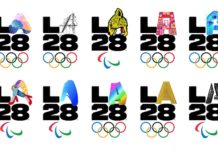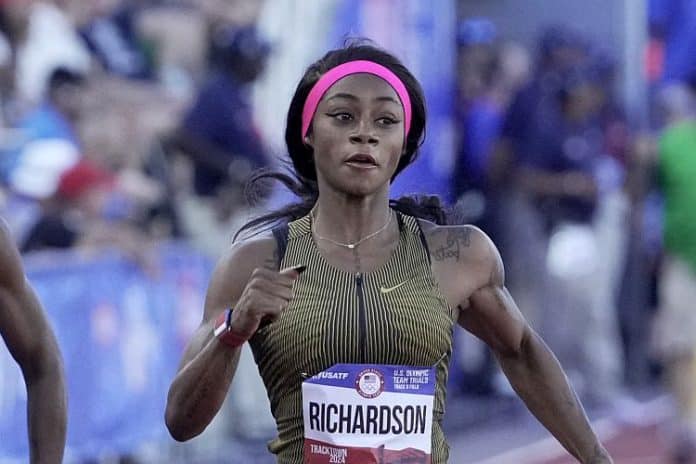★ The Sports Examiner: Chronicling the key competitive, economic and political forces shaping elite sport and the Olympic Movement.★
★ To get The Sports Examiner by e-mail: sign up here! ★
★ Friends: Thank you for caring! Now 19 donors have covered 33.4% of our technical costs for the rest of 2024. If you can support our coverage, please donate here. Your enthusiasm is the reason this site continues. It is. ★
≡ U.S. OLYMPIC TRIALS:
TRACK & FIELD ≡
The women’s 100 m final was the focus of the second day of the U.S. Olympic Track & Field Trials in Eugene, Oregon, and World Champion Sha’Carri Richardson was equal to the challenge.
In the semis, Richardson had another bad start, but came on strong to win the first race in 10.86 (+0.4), ahead of Tamari Davis (10.99) and Anavia Battle (11.09). Melissa Jefferson, the 2022 national champion, looked brilliant in semi three, surging in mid-race and then shutting it down to win in 10.87 (-0.2). Aleia Hobbs was a close second in 10.99, with TeeTee Terry third (11.04). Tamara Clark won semi two in 11.09 (0.0), just ahead of Candace Hill (11.10); NCAA champ McKenzie Long was fourth in 11.15 and did not advance.
In the final, it wasn’t the best start for Richardson, but it was a lot better than in the first two rounds. She was up and running into the lead by 40 m and pulled away to an impressive victory in a world-leading 10.71 (wind: +0.8 m/s)! Behind her was Jefferson, who emerged from the pack for a clear second in a lifetime best of 10.80 (no. 4 in 2024) and then former USC star Terry, who got a lifetime best of 10.89 (no. 7) out of lane two to make the team for Paris.
All three are coached by Dennis Mitchell, the 1992 Olympic men’s 100 m bronze medalist!
Six ran under 11 seconds, with Davis fourth in a seasonal best of 10.91, Hobbs in 10.93 and Clark in 10.95. Richardson was formidable and impressive and there is more in the tank.
The men’s shot was expected to be a showdown between two-time Olympic champ Ryan Crouser and Joe Kovacs, but with worries for Crouser after elbow and pectoral muscle injuries. But Crouser found his form, taking the lead at 22.44 m (73-7 1/2) and then 22.51 m (73-10 1/4) in round two. Kovacs reached 22.43 m (73-7 1/4) in the first round, but could not improve, when Crouser sent a bomb out in round four at 22.84 m (74-11 1/4), which ended up as the winner.
Kovacs did not improve and was second; Payton Otterdahl finally got to the top three in round five at 22.26 m (73-0 1/2) and will make his second Olympic team in Paris.
The men’s decathlon had Heath Baldwin of Michigan State as the leader after day one, and he won the 110 m hurdles at 13.77 to start day two, then the javelin at 66.39 m (217-9) and finished sixth in the 1,500 m to total a lifetime best of 8,625 points, no. 6 in the world for 2024. Two-time Olympian Zach Ziemek won the discus at 49.87 m (163-7) and the vault at 5.35 m (17-6 1/2) and was a clear second at 8,516. Harrison Williams, twice on the World Championships teams, moved up steadily and after Kyle Garland had to retire due to a foot injury, was second-fastest in the 1,500 m and finished third at 8,384. Devon Williams was fourth with 8,211.
In the women’s triple jump, Rio 2016 fourth-placer and American Record holder Keturah Orji got out to 14.18 m (46-6 1/4) in round two, with former four-time NCAA champ Jasmine Moore reaching 14.07 m (46-2) on her opener. Former American Record holder Tori Franklin got to 13.72 m (45-0 1/4) in the first round and stayed there, but equaled her best in round five as well.
But just as Orji looked like the winner, Moore blasted her final jump out to 14.26 m (46-9 1/2) and stole the event, although Orji reached 14.22 m (4-68) on her final try. None have the Olympic standard, but all three could go to Paris via their standing in the World Athletics World Rankings; all are in the top 13.
In the qualifying:
● Men’s 100 m: The heats started with World Champion Noah Lyles and 200 m world leader Kenny Bednarek in the same race, with Lyles getting a good start, taking over by 50 m and winning confidently in 9.92, with Bednarek also looking easy in 10.00 (+0.3). Fred Kerley, the 2022 World Champion, was running in Nike spikes, was an easy winner in 10.03 (+0.6) in heat two over Pjai Austin (10.06), and Brandon Hicklin won heat three from lane two in 10.08 (+0.2). Christian Coleman, the 2019 World Champion, breezed to the win in heat four in 9.99 (+0.1), and 2023 NCAA champ Courtney Lindsey took heat five in 10.00 (-0.1).
● Men’s 1,500 m: Semi one was slow enough that almost a dozen were in contention at the bell, with two-time NCAA Indoor champ Luke Houser leading, and continuing in front around the final turn. But World Indoor silver winner Cole Hocker came through on the inside and started a rush past Houser, winning in 3:37.89. The fastest closers were Liam Murphy from Villanova and Ethan Strand from North Carolina, both in 3:38.08. Cooper Teare, who has run 3:32.16 this season, was fourth in 3:38.26 and advanced.
Semi two had Worlds 3,000 m runner-up and favorite Yared Nuguse and World Road Mile champ Hobbs Kessler 1-2 with two laps left, and they led at the bell, with Henry Wynne closest. These two increased the speed and he and Kessler could not be headed, and ran through to the line in 3:34.09 and 3:34.16, looking composed and impressive. Wynne got third in 3:34.40, with 2023 NCAA champ Nathan Green fourth in a lifetime best of 3:34.49.
● Men’s Long Jump: It took only 7.80 m (25-7 1/4) to qualify, with USC’s NCAA fourth-placer Johnnie Brackins the leader at 8.03 m (26-4 1/4), ranked ahead of Will Williams, with the same distance. Damarcus Simpson got out to 8.00 m (26-3) on his final jump and was third.
● Women’s 400 m: Arkansas frosh and NCAA runner-up Kaylyn Brown went out hard in lane eight in heat one and held on and won in 49.71, ahead of Aaliyah Butler in 50.01, with Tokyo Mixed Relay gold medal anchor Alexis Holmes third in a lifetime best of 50.19 (and qualified on time).
Semi two was the resurrection of former USC star Kendall Ellis – remember her miracle 4×400 m anchor at the 2018 NCAAs? – storming around the turn and destroying a good field on the straight to get a lifetime best of 49.81. Shamier Little, better known as a 400 m hurdler, followed up her heat win with a hard run on the home straight to take second in 50.16, ahead of Quanera Hayes (50.46).
The final semi had Lynna Irby-Jackson, a Tokyo gold medalist on the women’s 4×400 m, ran a controlled race, then took over from 180 m on and led into the straight and won convincingly in 50.17. Isabelle Whittaker of Penn came on best in the straight to get second in 50.48.
● Women’s High Jump: It took 1.83 m (6-0) for the first 10 to go to the final, and 1.78 m (5-10) for two others. Vashti Cunningham, the 2016 World Indoor Champion, and a two-time Olympian, qualified with one jump.
More coming Sunday, with the men’s 100 m semis and finals, the steeple final, the women’s 400 m final, women’s hammer final, men’s vault and javelin finals. The heptathlon will also start.
¶
You can receive our exclusive TSX Report by e-mail by clicking here. You can also refer a friend by clicking here, and can donate here to keep this site going.
For our updated, 547-event International Sports Calendar for the rest of 2024 and beyond, by date and by sport, click here!



















